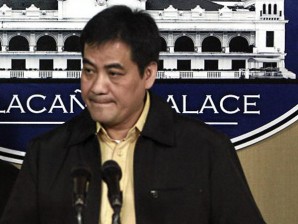Palace puts P3M cap on GOCC execs’ pay, benefits

Presidential spokesman Edwin Lacierda: A board member of any GOCC can receive only up to P3 million annually, including bonuses and per diem. INQUIRER FILE PHOTO
The Aquino administration has put a cap on the total amount of compensation package that goes to top honchos of government-owned and -controlled corporations (GOCCs).
Presidential spokesman Edwin Lacierda on Wednesday said that a board member of any GOCC could receive only up to P3 million annually, including bonuses and per diem.
“The P3 million is the maximum amount a GOCC director can receive on a yearly basis, not monthly basis,” said Lacierda at a briefing.
Lacierda said executives of GOCCs were mandated to disclose their bonuses, also known as “performance-based incentive” (PBI), and per diems.
Since they are not full-time personnel, directors don’t receive salaries.
However, the rank-and-file and other full-time staff members of GOCCs have regular salaries, bonuses and other emoluments.
Lacierda’s announcement came a week after the Inquirer reported that the Commission on Audit (COA) ordered officials and employees of 31 GOCCs to refund the government the P2.3 billion that they received in unauthorized bonuses and allowances in 2012.
In a report issued in September last year, the COA said the grant of fat bonuses and excessive allowances in certain GOCCS may have continued unnoticed by President Aquino despite the creation of the Governance Commission for GOCCs (GCG) in 2011.
In a phone interview, lawyer Paolo Salvosa said the GCG started to impose the P3-million cap as early as 2011.
“That’s when we imposed the cap on per diem. We decided that the big portion (of the compensation packages) should go to PBI,” Salvosa said.
Asked why the COA still disallowed the allowances, bonuses and benefits when the cap was already in effect in 2011, Salvosa said the COA report indeed noted that the Philippine Health Insurance Corp. (PhilHealth) and the Development Bank of the Philippines granted the excessive compensation in 2012, while the Philippine Charity Sweepstakes Office issued the unauthorized benefits in 2011.
Employees not covered
But he quickly added: “These are mainly employees. It (the COA report) doesn’t refer to the board of directors (BOD) for the most part. The P3-million cap doesn’t relate (to full-time personnel).”
He said the cap did not cover “rank-and-file employees and their officers.”
By “officers,” he was referring to regular officials of the GOCCs holding plantilla positions that were below the BOD level.
Salvosa said some of these excessive bonuses were stopped when the GCG stepped in. “A lot of those compensation allowances have been already traditionally received by employees when this administration [started],” he said.
The GCG was created to rationalize the grant of excessive perks, bonuses and allowances to GOCC officials, a practice that became rampant during the Arroyo administration.
Posting bonuses online
Lacierda said GOCCs were mandated to post their incentives online.
“You can all see that on the websites of each and every GOCC. GCG has mandated that all their performance-based incentives, their per diems should be posted [on] their own respective websites,” Lacierda said.
“That’s why it’s no secret to the public that all these bonuses, all these incentives are all posted there; that’s why you have a basis to say how much each director received,” he said.
“The total of that, under the GCG law, (or) the highest that you can get is P3 million,” said Lacierda.
Performance scorecard
According to Lacierda, members of GOCC boards were entitled only to per diem for their attendance during board and committee meetings.
“Having no salaries, there is no corresponding 13th month pay. So, if you total per diems and the performance-based incentives, which are dependent on their performance scorecard, the highest a director can receive is P3 million,” he said.
On top of the per diem, GOCC personnel receive bonuses, but only if they were able to meet the targets.
“Now, if you compare that with … the previous administration, for instance, in the Social Security System (SSS), the highest that you can get (as a director) was from P1.8 million to P13.5 million for a director,” he said.
Under the Aquino administration, not all of the directors can receive P3 million each because the total amount would depend on complying with a set of criteria or targets in the compensation-based incentive scheme, Lacierda said
Customer complaints
He said the GCG had also taken note, for instance, of the number of
customer service complaints directed at GOCCs, such as the SSS because of poor service.
“That is now being addressed by GCG as part of their performance scorecard for 2013. They have met with each and every GOCC and a requirement will be—a very distinct requirement is the customer service, addressing customer complaints,” said Lacierda.
Suggestions to gcg.gov.ph
The GCG has also spoken to each GOCC under its supervision, especially the frontline GOCCs like the SSS, Government Service Insurance System and PhilHealth.
“And GCG would also like to inform the public that they continue to improve the system of their scorecard. If there’s anything that you’d like to improve, feel free to inform them, feel free to write to gcg.gov.ph and suggest other measures to improve the performance scorecard,” Lacierda said.
RELATED STORIES
Palace defends bonus system of GOCC execs
Solon seeks inquiry into GOCC bonuses














